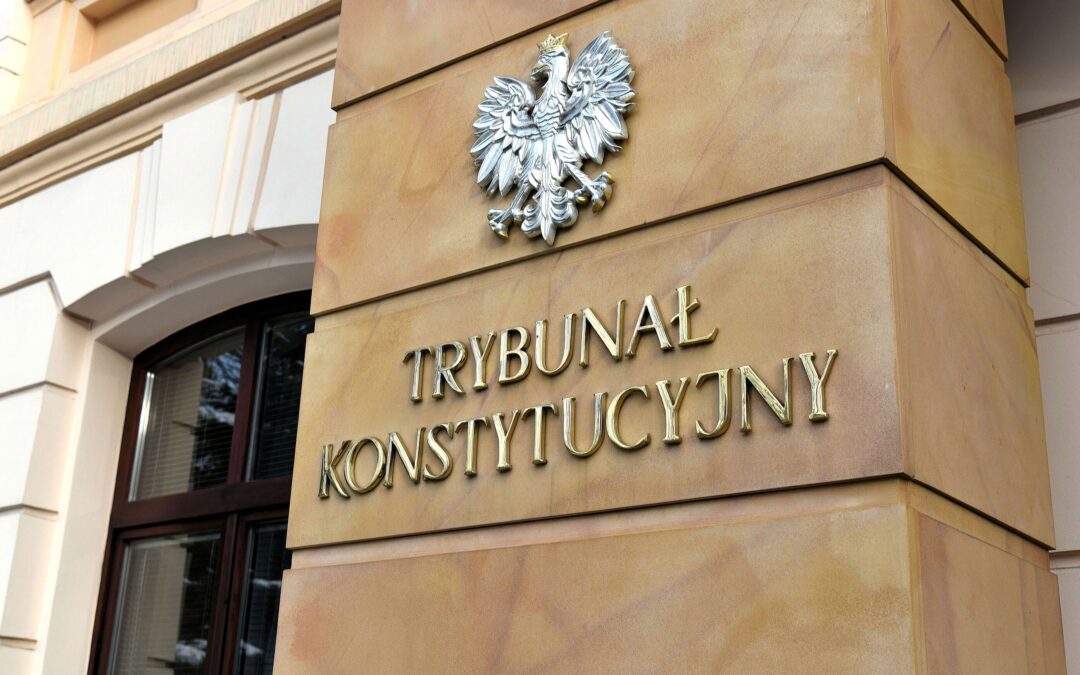The government’s majority in parliament has approved two bills that would overhaul Poland’s Constitutional Tribunal (TK) with the aim of undoing the politicisation of the court by the former Law and Justice (PiS) administration.
PiS, which is now in opposition, has condemned the proposed laws, with its leader, Jarosław Kaczyński, expressing his confidence that President Andrzej Duda, a PiS ally, will veto them.
Poland’s government has announced a package of measures aimed at “healing” the country’s constitutional court following eight years of rule by the national-conservative PiS party, whose actions rendered the body “defective” https://t.co/kWGJFOEVpw
— Notes from Poland 🇵🇱 (@notesfrompoland) March 4, 2024
The legislation was part of a package of reforms unveiled by the government in March intended to “heal” the TK after eight years of PiS rule, during which time the court had come to be seen as being under the influence of PiS.
Under one of the two bills approved by the Sejm, the more powerful lower house of parliament, on Wednesday, three TK judges who were illegitimately appointed under PiS would be removed from duty and all previous rulings made with their participation would be invalidated.
That aspect of the proposed laws has proved particularly controversial, with Poland’s human rights commissioner and parliament’s legislative bureau warning that it may be unconstitutional, reports the Gazeta Wyborcza daily. Under article 190 of the constitution, TK rulings are “universally binding and final”.
However, proponents of the bill argue that the rulings in question, which number just over 80, were issued illegitimately because of the involvement of people who were not lawfully appointed as judges. Therefore they are not valid TK rulings covered by constitutional protection.
The Supreme Court has found that rulings made by the Constitutional Tribunal (TK) involving judges illegitimately appointed under the former PiS government are invalid.
One such ruling was the near-total abortion ban introduced by the TK in 2020 https://t.co/0tDuHNMQ2p
— Notes from Poland 🇵🇱 (@notesfrompoland) January 3, 2024
Another stipulation of the legislation approved by parliament on Wednesday is that the TK’s current chief justice, Julia Przyłębska, would be removed from her position. The ruling coalition argues that she was improperly appointed under PiS in 2016 and that, in any case, her term in office has already expired.
Przyłębska is a close personal associate of Kaczyński and is widely seen as being responsible for bringing the court under PiS influence.
The newly approved legislation would also bar anyone who has been an active politician in the last four years from becoming a TK judge. That is intended to stop situations such as the one in 2019, when PiS appointed two of its recent MPs to the court.
Sorry to interrupt your reading. The article continues below.

Notes from Poland is run by a small editorial team and published by an independent, non-profit foundation that is funded through donations from our readers. We cannot do what we do without your support.
The legislation also includes a new safeguard intended to ensure that the TK cannot be so easily politicised again in future. It would require TK judges to be approved by a three-fifths majority in parliament rather than the current simple majority.
That would in practice mean that judicial nominees would need support from elements of both the ruling camp and the opposition to be approved.
“No one will politicise the TK anymore. This is proof of the purity of our intentions,” said Patryk Jaskulski, an MP from Civic Coalition (KO), the main ruling group, quoted by Gazeta Wyborcza.
However, while KO and its junior partners in the government, Third Way (Trzeczia Droga) and The Left (Lewica), pushed through the bills, they were opposed by both PiS and Confederation (Konfederacja), the two main opposition parties.
Parliament has approved a bill aimed at restoring the independence of the body responsible for nominating judges.
The former PiS government's move to bring it under political control was at the heart of the rule-of-law crisis that emerged during its rule https://t.co/OnAUV5RDQS
— Notes from Poland 🇵🇱 (@notesfrompoland) April 13, 2024
“This is an attempt to simply abolish the Constitutional Tribunal,” declared Kaczyński, speaking to broadcaster wPolsce. “Because what is the purpose of the TK…[if] the parliamentary majority can change any of its decisions?”
Kaczyński, however, said that he was confident that Duda would veto both the bills. The president, a former PiS politician, worked closely with the PiS government on its judicial reforms and appointments.
The two bills now pass to the upper-house Senate, where the government also has a majority and which can, in any case, only delay legislation. After being approved by parliament, they go to Duda for his signature or veto.
Alternatively, Duda can refer bills to the TK to rule on their constitutionality, which in this case would mean the court effectively assessing the validity of some of its own judges and rulings.
"Tusk was sent here to liquidate the Polish state" and turn Poland into “an area inhabited by Poles but managed from outside”, says opposition leader Jarosław Kaczyński.
He called on his supporters to “take various types of action in defence of Poland" https://t.co/rXv8Q1WABJ
— Notes from Poland 🇵🇱 (@notesfrompoland) July 9, 2024
Main image credit: Adrian Grycuk/Wikimedia Commons (under CC BY-SA 3.0)

Daniel Tilles is editor-in-chief of Notes from Poland. He has written on Polish affairs for a wide range of publications, including Foreign Policy, POLITICO Europe, EUobserver and Dziennik Gazeta Prawna.



















